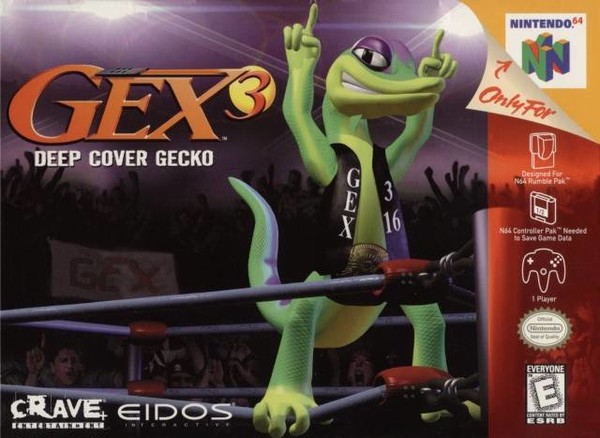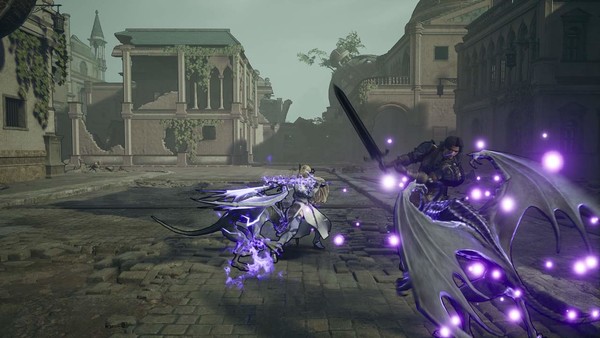This Week in Games
What in The Fresh Hell is Going On With Square-Enix?
by Heidi Kemps,
Hello again! It's another week with… honestly not a lot of gaming news, but what we do have is very much worth digging into.
This would normally be the time of year where E3 hype would start building… except that E3 got taken out back behind the barn and shot to put it out of its misery. So instead, we're reliant on Geoff Keighley and his many, many celebrity connections to fill in the void left by E3's departure and bring us Summer Games Fest 2022 on June 9.
Get ready!!@IMAX is teaming us with us for #SummerGameFest on June 9 and @TheGameAwards in December!
— Geoff Keighley (@geoffkeighley) May 5, 2022
That's right: Watch all the reveals, surprises and announcements with your friends in select IMAX theaters for full-scale immersion :)
This is going to be cool! IMAX LIVE! pic.twitter.com/dvQPIgqF09
Yes, if you really want to, you can go to an IMAX theatre in your area (provided one exists and they're participating) to watch all of the announcements as they happen. Watching a bunch of game trailers in a theatre with random obnoxious console warriors trying to be Tom Servo sounds like the exact opposite of a good time to me, but if it sounds fun to you, knock yourself out.
But that's not the big news. The REAL big gaming news this week involves Square-Enix, and I've got a lot of things to say about it. So, for this week's column, we're going to be asking:
WHAT IN THE FRESH HELL IS GOING ON WITH SQUARE-ENIX?
Square-Enix made headlines again this week when they announced that they were selling off a bunch of their western studios and IPs to the Embracer Group. Specifically, they're selling off IPs and studios that they had acquired from the purchase of Eidos back in 2009. This includes historically significant and well-loved franchises like Tomb Raider, Deus Ex, and Thief, along with the studios Crystal Dynamics and Eidos Montreal. The Embracer Group—a Swedish conglomerate that owns a good amount of entertainment companies like THQ Nordic, Gearbox, and Dark Horse Comics—will assume ownership over all of these properties for a mere $300 million, which seems really low!

But perhaps it was inevitable. Square-Enix and Eidos seemed like a bizarre marriage from the outset. But 2009 was the start of that brief period where big Japanese publishers, seeing a decline on their home turf, were exceptionally desperate to get some of that Western money. But instead of playing on their internal teams’ development strengths to make quality games with broad appeal, they opted to acquire Western studios instead.
So here you had Eidos, a publisher with beloved, very Western-focused franchises and a unique identity, paired up with Square-Enix, a big Japanese conglomerate that operated in a very corporate Japanese way and whose specialty was games that were the polar opposite of Eidos’ output in terms of aesthetic and design approaches.

Honestly, the more I think about it, the more I'm surprised Squeenix held onto them for this long. In so many ways, it feels like Square-Enix had hilariously unrealistic expectations for them. Remember how games like the Tomb Raider reboot and Sleeping Dogs sold millions of copies, but still not enough to please Squeenix's corporate moneymen?
This process seemed to repeat for practically every single game the former Eidos crew released. They did exceptionally well by most metrics, but not exceptionally well enough. Squeenix's investment in Marvel properties like Avengers and Guardians of the Galaxy—which they proceeded to give to Crystal Dynamics and Eidos Montreal to work on—looks more and more like a last-ditch effort to try and make the continued investment in these studios worth it.
Meanwhile, formerly flourishing IPs like Legacy of Kain, Conflict, and, uh…. Gex lay dormant. (They may be a punchline now, but Gex games made bank. The late 90s were peak Tail Time.)

The low selling price of $300 million reads like a big “yeah, we're done here, we want to sell all of this and wash our hands” statement. (As a side note, the Embracer group is somewhat known for buying up studios, IPs, and publishers on the cheap, usually after bankruptcy, so I'm sure they're pleased as punch for scoring this bargain.) Usually when sales like this happen, there's a lot of consternation among fans who worry about the fate of their favorite franchises, but in this case… the reaction was almost universally positive. Longtime fans of Eidos’ games were deeply unhappy with how Square-Enix had handled things. When developer IO Interactive managed to re-acquire the rights to their Hitman games, there was a spark of hope that maybe other beloved Eidos series might be freed from Squeenix's iron grip. Now it's finally happening, and everybody is relieved.
It really feels like the end of an era—one that probably should have ended a long time ago when Japanese studios realized their ill-thought-out Western pushes weren't working. Did any Japanese publisher manage to do well with its Western studios? The only one I can think of is Sega, who own developers like Creative Assembly, Relic Entertainment, and Two Point Studios, among others. Sega of Japan seems content to let these studios make games that appeal to specific niches—Total War, Football Manager, Company of Heroes, etc.—without much meddling. Compare that to how Square-Enix tried to make every Eidos game a massive multiplatform all-appealing blockbuster. I think Sega's approach makes a lot more sense. (Though I am worried about this whole “Super Game” initiative impacting their studios’ freedoms going forward…)
The sale of Eidos brings up a much bigger topic of discussion, however: what is Square-Enix even trying to do nowadays?
Right now, Square-Enix is primarily buoyed by Final Fantasy, Dragon Quest, and Kingdom Hearts, all massive properties with long histories that can be spun-off and merchandised for years on end. All three of these series have big new numbered installments coming, but they won't be available for a quite a long time. Square-Enix needs something to fill those gaps, and they've just officially given up on Eidos… which means now they're throwing everything at the wall and seeing what sticks. So now we're getting another Star Ocean, a new action Valkyrie Profile that isn't really Valkyrie Profile, a new strategy-RPG we're not entirely sure we want yet in DioField Chronicle, and the massively-budgeted isekai action-RPG Forspoken. These games don't have a lot in common, but Square-Enix sure hopes at least one of them manages to take off!

This isn't new, though: Square-Enix has been operating this way for years, but nowadays it's really noticeable. While it's good not to put all your eggs in one basket, this approach causes a lot of problems: it makes games more difficult to properly market, it stretches staff thin and results in less quality oversight, and ultimately results in a push to make products simpler, less unique, and more mass-market-appealing. Hits like NieR Automata and Octopath Traveler do happen on occasion, but there are also stunning disasters like Balan Wonderworld (which we discussed last week) and Babylon's Fall (a game that was heavily delayed and turned into a generic live-service slog to capitalize on market trends). Not to mention a whole mess of assorted sales and critical disappointments. Let's not forget Squeenix's retro missteps, either: the combined retro libraries of Squaresoft and Enix are filled with games ripe for remakes and remasters, but when they do decide to dig something out of the vault, the quality is a complete crapshoot, suffering the same issues I listed above.
It all leads to a feeling that Square-Enix are a soulless, money-hungry corporation whose management doesn't care about what they're putting out. Folks like Yoko Taro and Naoki Yoshida certainly have passion, but the executives above them seemingly couldn't care less. The last few months have been especially bad: the headass comments from company leaders about NFTs, the metaverse, and “playing to earn” around the new year rightfully ruffled feathers, and Yuji Naka's Twitter tirade against the company last week accusing them of mishandling their games backs up the idea that Squeenix is hostile to consumers. And then you see them dumping Eidos for a relative pittance. As good as that might be for Eidos, it really does feel cold and uncaring on Squeenix's end.

I don't think Square-Enix is in any danger of going belly-up in the immediate future, but I do think things might get rocky if they continue to alienate fans and former employees. And as much as I'm not happy with Squeenix's current direction, I really don't want to see them gobbled up in an acquisition by another megacorporation and lose what personality they have left. But to do that, they'll need to give their future releases the development time, marketing, and creative freedom they need to flourish—and since they're currently distracted by chasing crypto and live-service money, that's not easy to do.
As long as they allow Taito to act mostly autonomously, though, they're doing at least one thing right by me.
PHEW. Man, it feels kinda nice to get my thoughts about Square-Enix out there. What do you think—is Squeenix headed in the wrong direction? What can they do to improve their output? How does the Eidos sale affect your perception of them? Are you a long-suffering Legacy of Kain fan hoping that this sale will finally make something happen with the series? (I feel for you, I really do.) There's plenty to talk about, so you're quite welcome to sound off in the forum—link below! Thanks again for reading, and I hope you all have a lovely weekend.
discuss this in the forum (31 posts) |